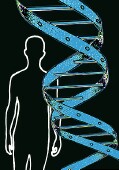
WEDNESDAY, June 5 (HealthDay News) — The discovery of a genetic variation that affects how some black patients respond to the blood thinner warfarin could improve the safety and effectiveness of the drug, researchers report.
Blacks with this common genetic variation need a significantly lower dose of warfarin than those without the variation, the researchers report online June 4 in The Lancet.
“Adding this genetic marker — found in more than 40 percent of African-American patients in the study — to standard dosing algorithms improved the predictability of warfarin dosing by 21 percent in these individuals, which has the potential to increase the safety and effectiveness of this notoriously hard-to- dose drug,” study leader Julie Johnson, of the University of Florida, said in a journal news release.
Warfarin is widely used to prevent blood clots in patients with a heart rhythm disorder called atrial fibrillation, a history of previous blood clots and after major surgery. However, it can be difficult to determine the correct dose for individual patients.
Previous research has identified two genes that explain about 30 percent of the difference in warfarin response in people of European and Asian ancestry, but these genes have less of an effect in blacks.
In this study, the researchers analyzed health information and DNA samples from hundreds of blacks and determined that there was a strong association between the rs12777823 variant on chromosome 10 and warfarin dose. The findings suggest that the dose of warfarin required by blacks with one or two copies of this variant is about 7 milligrams (mg) to 9 mg less per week than for other patients, the researchers said.
The U.S. Food and Drug Administration advocates use of genetic backgrounds to help guide warfarin dosing, Mark Alberts, of the University of Texas Southwestern Medical Center at Dallas and author of an accompanying editorial, said in the news release. “However, the practical aspects [and limitations] have not been fully appreciated.
“Genetic testing has several challenges: it is not widely available in some areas; it is costly; and clinicians often can identify the correct dose before test results are available. If these problems were corrected, the actual use of such tests might increase substantially,” Alberts noted.
More information
The American Heart Association has more about warfarin.

